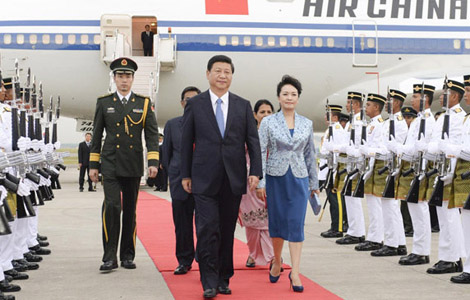China ups ante with ASEAN
Updated: 2013-10-04 23:41
By kavi chongkittavorn (China Daily)
|
||||||||
'New strategic breakthroughs' likely in relations with Southeast Asia
China is wooing members of the Association of Southeast Asian Nations as never before. President Xi Jinping has already made Indonesia and Malaysia, the two leading Muslim countries in the ASEAN, destinations on his first trip to Southeast Asia.
Aside from his official visits to Jakarta and Kuala Lumpur, Xi will be among dozens of global leaders crisscrossing Southeast Asia to attend the Asia-Pacific Economic Leaders meeting in Bali, Indonesia, next week. Meanwhile, Premier Li Keqiang will travel to Brunei for the East Asia Summit and then an official visit to Thailand.
In his interview with Indonesian media published on Wednesday, Xi outlined China's long-term desire to further develop ties with Indonesia and the rest of the ASEAN. Two areas stood out — strategic matters and confidence building measures. Xi also called for a deepening of defense and security cooperation as well as the mechanism for meetings between the defense ministers of China and the ASEAN. In other words, like other successful bilateral arrangements with the ASEAN in the past two decades, China would like to establish an exclusive forum under the framework of the ASEAN Defense Ministerial Meeting plus one. At the moment, there is only the ADMM-plus formula comprising the United States, China, Japan, South Korea, India, Australia, New Zealand and Russia. Beijing hopes that similar cooperation with the ASEAN will strengthen mutual trust and cooperation in law enforcement and security matters.
Xi's other main point in the interview was the reinforcement of China's commitment as outlined by Premier Li in Nanning in early September.
Li has described the ASEAN-China Strategic Partnership from 2002-13 as the golden decade. He further added China is now ready to turn the pivotal strategic relations into a "diamond". As such, China, under the current fifth generation of leadership, will do everything it can to "make new strategic breakthroughs".
Since the new administration came to office in March, China has come up with a series of strategies for the ASEAN as a whole. Apart from the upgrading of the free trade agreement and strengthening financial cooperation, which has been the hallmark of ASEAN-China relations, China also seeks to assist the ASEAN in improving its infrastructure — both hardware and software — in all fields with green-oriented strategies.
Apart from strengthening defense and security cooperation, Li proposed that another two areas of ASEAN-China relations deserve attention as they will affect future ties. One is maritime cooperation and the other is extensive people-to-people exchange programs. Although China has already proposed establishing the China-ASEAN maritime partnership for some time, ASEAN has been lukewarm to the idea — mainly due to the impasse in the South China Sea dispute. However, the inaugural meeting in Suzhou recently on the code of conduct on the South China Sea produced an air of optimism — according to a senior Thai diplomat — to the effect that ASEAN is now seriously looking at a framework for maritime cooperation with China. Beijing has allocated 3 billion yuan ($490 million) for such cooperation.
To serve as an example, Thailand has already put forward two major proposals — on maritime environment conservation and a study of tuna stocks in the South China Sea. Thailand also hopes that other members will make use of this fund. Thailand will host the next round of the working group on the South China Sea early next year, which will build on the scope and issues identified last weekend.
Both Xi and Li have reaffirmed that China has placed emphasis on new forms of diplomacy in the region. Obviously, most of the global media attention has essentially focused on US-China relations, especially the aftermath of the Obama-Xi summit in California. The rapport between both leaders and their countries' stronger ties have already had a positive effect on the regional strategic environment, especially on overall ASEAN-China relations.
At the recent preparatory discussion in Brunei on the upcoming East Asia Summit, there was a better atmosphere in addressing the themes of the leader-only strategic forum. While the summit will focus this time on developmental issues, as suggested by China, it will also look at regional and security issues. Food and energy security, humanitarian and disaster relief and management, as well as pandemics have been identified and will top the summit agenda.
The ASEAN welcomes China's initiative on people-to-people and cultural exchanges. This is the most tangible proposal by China in terms of promoting understanding and cooperation among young people in China and the ASEAN and ensuring the mutual appreciation of their histories and cultures. The number of students from ASEAN members in China will increase with the Chinese government's 15,000 scholarships — the largest single offer from any government to the ASEAN.
During the Chinese leaders' visit, China and the ASEAN will not shy away from addressing the South China Sea issue due to the renewal of mutual trust and progress made between both sides over the discussion of code of conducts in the South China Sea in the past months. Both the ASEAN and China have already agreed to move forward step by step based on consensus as the approach on the principles to secure peace and stability in the South China Sea.
The author is assistant group editor of The Nation in Thailand.
Most Viewed
Editor's Picks

|

|

|

|

|

|
Today's Top News
Gunfire forces brief lockdown at US Capitol
US military conducts missile defense test
US needs to address spending problem
Trending news across China on Oct 4
President Xi meets Malaysian PM on ties
DC shutdown gets social media all in a twitter
Hotels aside, AVIC needs to grow its service arm
Mutual help the best: IMF chief
US Weekly

|

|













